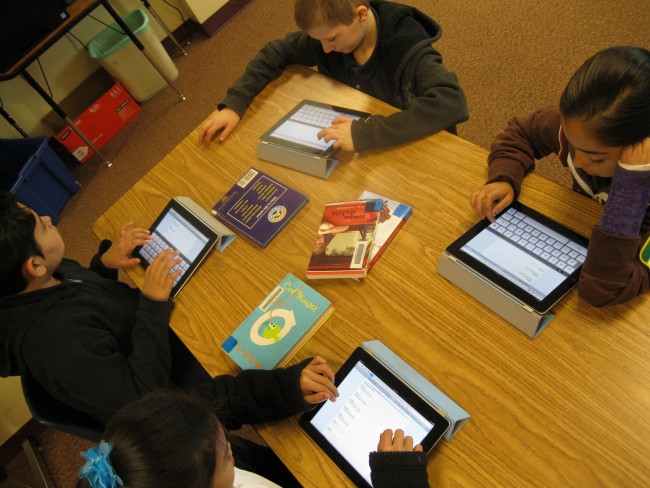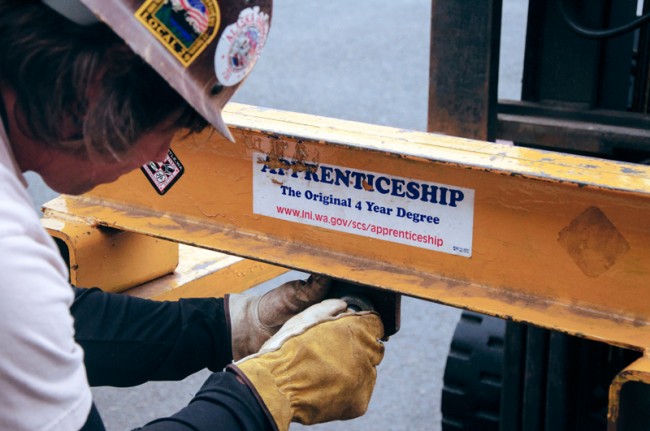by Kimberly Sawatka | May 23, 2014
 Georgia Center for Opportunity’s mission to remove barriers to opportunity is greatly facilitated through partnerships with organizations engaged in dynamic work in the community. Over the month of May the Breakthrough Fellows and GCO team members have ventured out, meeting with non-profits that serve unique at-risk populations. On one such trip, we were fortunate to speak with Jenn McEwen about her work at Wellspring Living, an organization dedicated to sheltering and restoring victims of sex trafficking.
Georgia Center for Opportunity’s mission to remove barriers to opportunity is greatly facilitated through partnerships with organizations engaged in dynamic work in the community. Over the month of May the Breakthrough Fellows and GCO team members have ventured out, meeting with non-profits that serve unique at-risk populations. On one such trip, we were fortunate to speak with Jenn McEwen about her work at Wellspring Living, an organization dedicated to sheltering and restoring victims of sex trafficking.
Tucked away just outside of Atlanta’s city limits, Wellspring’s secluded campus creates a warm environment for its residents. Close to one hundred minors and adult survivors participate in the Wellspring Living for Girls and Empowered Living for Women programs. Services through both programs range from intensive one-on-one therapy for Domestic Minor Sex Trafficking (DMST) to job skills training. The women of Wellspring, who are almost all referred by the state-run organization Georgia Cares, generally stay up to eighteen months. However, additional time is provided where it is needed.
Our host, Ms. McEwen, noted that girls are often lured into the sex trade by pimps selling the fantasy of love, capitalizing on disruptive home lives, or through physical coercion. While many would still like to believe that sex trafficking is an issue confined to areas such as Southeast Asia, major American cities are now thriving hubs for illegal sex work and exploitation. Nationally, as many as 27 million people are victims of sexual exploitation, with a vast majority being children. In a town known for its glorified strip club culture, Atlanta’s underground sex industry generated more than $290 million in 2007. This figure is likely much higher now. More recent studies note that the average pimp in Atlanta makes over $30,000 a week.
In Georgia, much work remains to change policies that criminalize the victims of sex trafficking rather than the perpetrators who reinforce commercialized sex. Just last year, the city of Atlanta proposed to banish convicted prostitutes, pimps, and Johns, which would make it illegal for offenders to enter areas with high rates of prostitution. However, this city ordinance, referred to as Stay Out of Area-Prostitution (SOAP), was never successfully passed due concerns that such as measure would further disadvantage the exploited.
As prostitutes are arrested at higher and disproportionate rates to pimps and Johns, more intentional policies are needed that target both the supply and demand sides of sex trafficking. In San Francisco, CA and Knoxville, TN, convicted Johns are mandated to participate in classes that expose the truth about what happens to the exploited after services are rendered. These “John Schools”, as they are called, often include restorative justice elements where former sex workers run the one-day classes and share their stories.
One thing is for sure: more havens such as Wellspring Living are needed across the state of Georgia. Ms. McEwen shed light on the gaps in service and the resulting opportunities, both in policy and program delivery, that impact her work. Inter-agency collaborations and community partnerships remain an integral component to increasing the support available to the victims of sex trafficking. As family breakdown and limited access to quality education open the door for exploitation, we at GCO hope to establish a strong working relationship with Wellspring, creating new possibilities and better outcomes for victims.
by Kimberly Sawatka | Apr 17, 2014
Below is a guest blog by Dr. Eric Wearne of Georgia Gwinnett College and formerly with the Governor’s Office of Student Achievement. Dr. Wearne currently leads GCO’s College & Career Pathways working group.
**********************************

In its 2013 Report Card, Digital Learning Now, a project of the Foundation for Excellence in Education, argued:
State policy can remove barriers to innovative approaches or it can stifle them with restrictions, red tape, and reinforcement of traditional, unsustainable approaches. It can accelerate reform or it can further entrench the status quo. Without changing state policy, innovative tools and models will fail to scale.
According to the Report Card, however, the news is good:
“states are rising to the challenge of supporting next generation models of learning. In 2013, states debated more than 450 digital learning bills with 132 signed into law. This builds on a record year in 2012 when state lawmakers introduced nearly 700 bills and signed 152 into law.”
To explore these issues specifically, Georgia Center for Opportunity’s College and Career Readiness Working Group heard from Sam Rauschenberg, Deputy Director of the Governor’s Office of Student Achievement, who facilitated the Task Force, and Carla Youmans, Instructional Technology Specialist at South Forsyth High School in Forsyth County, who is coordinating a new hybrid program at that school.
The Governor’s Digital Task Force
In 2012, Governor Deal created a task force to look into online learning in Georgia. The Governor’s Digital Learning Task Force met over the course of 2012-13, and provided recommendations to Governor Deal in December of last year. The Task Force’s recommendations fall into three categories:
- Infrastructure
- Digital Content and Courses
- Blended and Competency-Based Learning
The state has already started to implement some of the Task Force’s recommendations on infrastructure. For example, the FY15 budget includes $3.9 million to connect school systems to the University System’s PeachNet. The AFY14 and FY15 budgets also include $14 million in bond funds to the Georgia Department of Education for district and school grants for equipment required to receive and use added bandwidth (edge devices, LAN, wireless, etc.), and $25 million in general funds to the One Georgia Authority for grants to support extension of high-speed internet access in schools.
Still, opportunities exist in the areas of digital content and courses, and experimenting with new models for blended and competency-based learning. For example the state, via the Georgia Department of Education, currently provides teachers with access to lesson and video content online. However, to maximize teachers’ use of the materials and the potentially transformative power of online learning, much more can be done. The working group discussed the concept of course choice, as has been adopted in Louisiana, and the idea of opening online schools developed in one school system to students from any other school system. Conceptually, the competition should make for improved products and services, all for the purpose of better serving Georgia children. The Governor’s Task Force report alludes to barriers that could make online learning easier and higher-quality. Enabling competition and other market-based approaches would help do that.
South Forsyth High School Hybrid
One school in Georgia that is experimenting within current structures is South Forsyth High School. South Forsyth is preparing to offer a hybrid schedule to a select group of students next year. Mondays are “synchronous”: students will sign on to their class websites when school starts, teachers will teach them online for a portion of the class period, and then students will work independently at home for the rest of the period. Then students will check in again when their next class starts. Tuesdays, Wednesdays, and Thursdays, students come to campus and attend class as all other SFHS students do. Fridays are “asynchronous”: students receive their assignments online, but are free to complete them at their own speed. If a students’ grade drops below a certain level, however, that student is obligated to come in and meet individually (or in very small groups) with the teacher. The implications of this kind of system are many: struggling students can be identified and also given individual help more easily, and within the normal time constraints of a school week; students receive the kind of practice in self-regulation they will need in college; etc.
South Forsyth’s arrangement may not work for every school or every student, and digital learning overall is still in its infancy – we simply don’t yet know the best methods or all the possibilities involved with online learning. But as one task force member argued, we don’t necessarily need one 100 percent solution to improve student achievement and to increase opportunities; we could be successful with 100 one percent solutions. The Governor’s Task Force and South Forsyth High School’s hybrid program play important parts in state and local experimentation that can lead to better outcomes for Georgia students.
by Kimberly Sawatka | Apr 8, 2014

The Breakthrough Fellows, along with other GCO team members, recently had the opportunity to watch and reflect on the movie Les Misérables. For those unfamiliar with the story: an ex-convict, Jean Valjean, restores value to his life after a priest accepts him into his home and gives him a second chance to live with dignity. Though Valjean is able to turn his life around, the troubles of his past come to haunt him as his law-zealous adversary, Inspector Javert, recognizes him from his former life.
I found the story of Les Misérables so moving because it perfectly depicts the power of being grounded in morals and bringing purpose to one’s life. By accepting the challenge to become a new man, Valjean is able to transition his life from one stripped of purpose to one dedicated to serving others with true compassion. And though Inspector Javert’s pursuit continually disrupts Valjean’s peaceful life, the morals instilled by the priest are never forgotten. This serves Valjean immeasurably as he overcomes the temptation to slip back into his old ways.
Just as ethics and morals are vital to living well in our personal lives, organizations too must be grounded in values. This reflection on Les Misérables came just on the heels of a larger team discussion about the core values of Georgia Center for Opportunity. Under the example of a ship’s ballast (the heavy material that steadies a vessel), GCO’s President, Randy Hicks, listed Dignity , Humility, Integrity, Excellence, and Team as the traits that guide our work. Through evidence-based policy and community-based solutions, the true foundation of what we do is serving others with these values.
Integrity, Excellence, and Team are common core values for organizations that strive to produce high quality work. What I think makes GCO’s core values unique in the world of think tanks is our inclusion of Dignity and Humility. Often what makes policy effective is not the letter of what is written but rather the principles that connect laws and programs to a higher purpose. As human beings, each of us is inherently valuable and deserving of respect. We know that many of our fellow citizens face barriers to opportunity that limits their ability to thrive, driving our work and creating a sense of urgency. This is how Dignity is made manifest in our work.
But removing barriers to opportunity is complex, and the GCO staff certainly does not have all the answers. Thus we rely on the communities we serve to teach us about their challenges and we work with expert panels and community partnerships to help us identify and implement solutions. We work hard to affect change while keeping in mind our Humility, knowing the limits of what we can achieve alone and recognizing that our greatest impact is realized through working with others.
Human dignity lives by our ability to meet neighbors as equals irrespective of life circumstances, and the ability to accept the compassion of neighbors in times of need. In Les Misérables both Humility and Dignity are not only restoring forces in Jean Valjean’s life, but also guide his interactions with others as a new man. At GCO we recognize, as Jean Valjean did, that it is necessary to hold steadfast to one’s core values. The values that guide our personal lives and our work have the powerful ability to shape a better world around us and hold us to a higher purpose.
by Kimberly Sawatka | Mar 28, 2014

This week the Atlanta Science Festival offered a variety of events scattered across the city to indulge the curiosity of students young and old. As a self-admitted nerd, I was delighted to attend an event last night with the company of my 9 year old brother.
Prompted by his 3rd grade studies of space, my brother and I took full advantage of the festival by attending an open house at Agnes Scott College’s Bradley Observatory. The evening was hosted by the Astronomy Department, and visitors were able to learn about moon phases, view a planetarium show (my favorite part!), and tour the telescope tower amongst other science activities.
As we worked our way through the activity stations, I was thrilled to see my brother enhance his knowledge of the cosmos through such a fun community-based event. It is not every day that a student gets to engage professionals who work in unique areas such as astronomy. My brother really seemed to benefit from the opportunity to ask the professors as many questions as he could. Likewise, conversations with the undergraduate tour guides were a highlight for me. Hearing one student’s aspiration to work for NASA and another student’s study of life in space, I secretly hoped this experience planted a seed of interest in my brother.
Beyond looking through a telescope, my evening at the observatory emphasized the continuing need to spark interest in STEM (science, technology, engineering, and math). In the context of the College and Career Pathways initiative, this is particularly vital as America’s economy becomes more rooted in technical and specialized industries. Events such the Atlanta Science Festival are incredibly important as they not only offer early exposure to the careers of the future, but also facilitate partnerships that benefit schools, businesses, and families alike.
(If you would like to take part in Atlanta Science Week yourself, don’t miss Exploration Expo at the Georgia World Congress Center!)
by Kimberly Sawatka | Mar 10, 2014
Below is a guest blog by Dr. Eric Wearne of Georgia Gwinnett College and formerly with the Governor’s Office of Student Achievement. Dr. Wearne currently leads GCO’s College & Career Pathways working group.
************************************

Over the past several months, the Georgia Center for Opportunity’s College and Career Readiness working group has focused on big-picture concepts relating to “college readiness”. Presentations by administrators from Georgia Gwinnett College, as well as from the Foundation for Educational Success, which creates and administers programs on non-cognitive variables, have helped shape our discussion so far.
Most recently, the working group turned its focus towards “career readiness” issues. Early on in the group’s work, panelists supported the ideas coming from Mike Rowe’s foundation, and his theory that American education has not been serving great numbers of American students:
“A trillion dollars in student loans. Record high unemployment. Three million good jobs that no one seems to want. The goal of Profoundly Disconnected is to challenge the absurd belief that a four-year degrees the only path to success.”
To continue its research in this area, this month the panelists heard from both state-level and national experts on various needs and approaches specific to Georgia.
Matthew Gambill, Executive Director of the Georgia Association for Career and Technical Education, spoke to the group and answered questions. The idea of considering CTAE courses as academic credits; the need for more (and more well-supported) career academies across the state; and the idea of trying new advisement approaches to strengthen school counselors’ relationships with individual students were all topics of conversation.
The group also heard from Bob Lerman of the Urban Institute and American University. Dr. Lerman has spoken on MSNBC about the need for apprenticeship programs in the U.S., and is a founder of the American Institute for Innovative Apprenticeship.
Dr. Lerman talked about the relative strength of apprenticeships in Georgia compared to other states, noting the Georgia Youth Apprenticeship Program. He also argues that the Common Core State Standards, because of their one-size-fits-all approach, especially in high school, set up the possibility, or even the probability, of crowding out career-based programs with their focus on college readiness. Ultimately, while Georgia is actually doing some work to promote education and training for careers, Dr. Lerman felt that some opportunities exist in the state for improvements, including getting local businesses more involved in the process of partnering with schools and setting up apprenticeships; keeping the standards for entry into apprenticeship programs high (as a point of comparison, Teach for America, which is rapidly growing and has a good reputation among academically strong students, has a very high bar for entry); and making sure students are getting good counseling, especially in 9th and 10th grades.
Both speakers independently echoed some of the ideas the working group has been hearing in the context of college readiness – that individual relationships with students matter; that students are seeking more and more specific choices and options in their educational careers; and that big, sweeping programs intended to solve every problem for everyone of Georgia’s nearly 2 million students might just be too big.
 Georgia Center for Opportunity’s mission to remove barriers to opportunity is greatly facilitated through partnerships with organizations engaged in dynamic work in the community. Over the month of May the Breakthrough Fellows and GCO team members have ventured out, meeting with non-profits that serve unique at-risk populations. On one such trip, we were fortunate to speak with Jenn McEwen about her work at Wellspring Living, an organization dedicated to sheltering and restoring victims of sex trafficking.
Georgia Center for Opportunity’s mission to remove barriers to opportunity is greatly facilitated through partnerships with organizations engaged in dynamic work in the community. Over the month of May the Breakthrough Fellows and GCO team members have ventured out, meeting with non-profits that serve unique at-risk populations. On one such trip, we were fortunate to speak with Jenn McEwen about her work at Wellspring Living, an organization dedicated to sheltering and restoring victims of sex trafficking.



